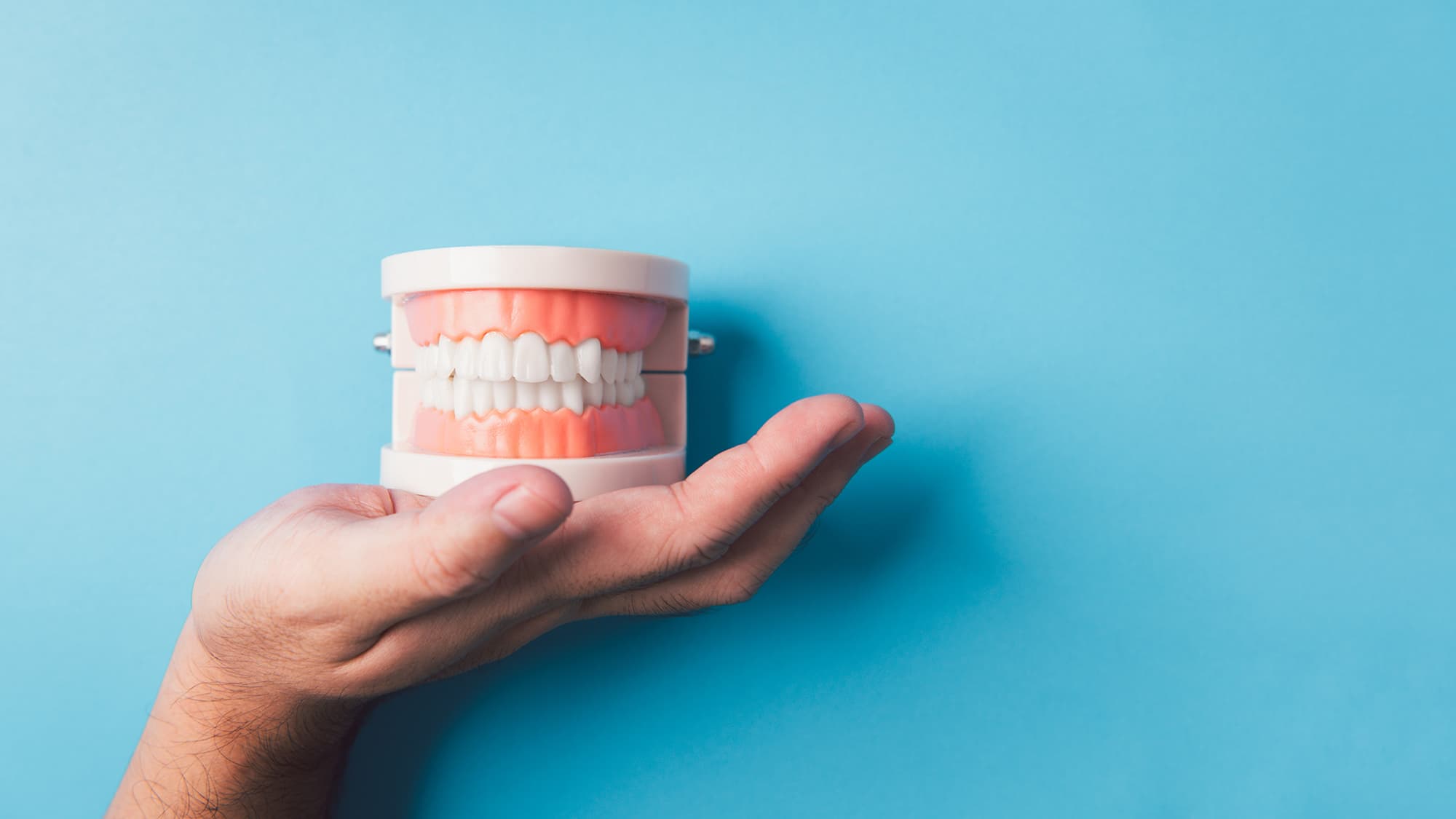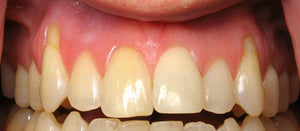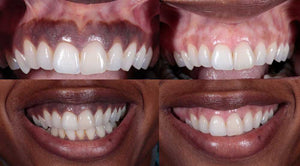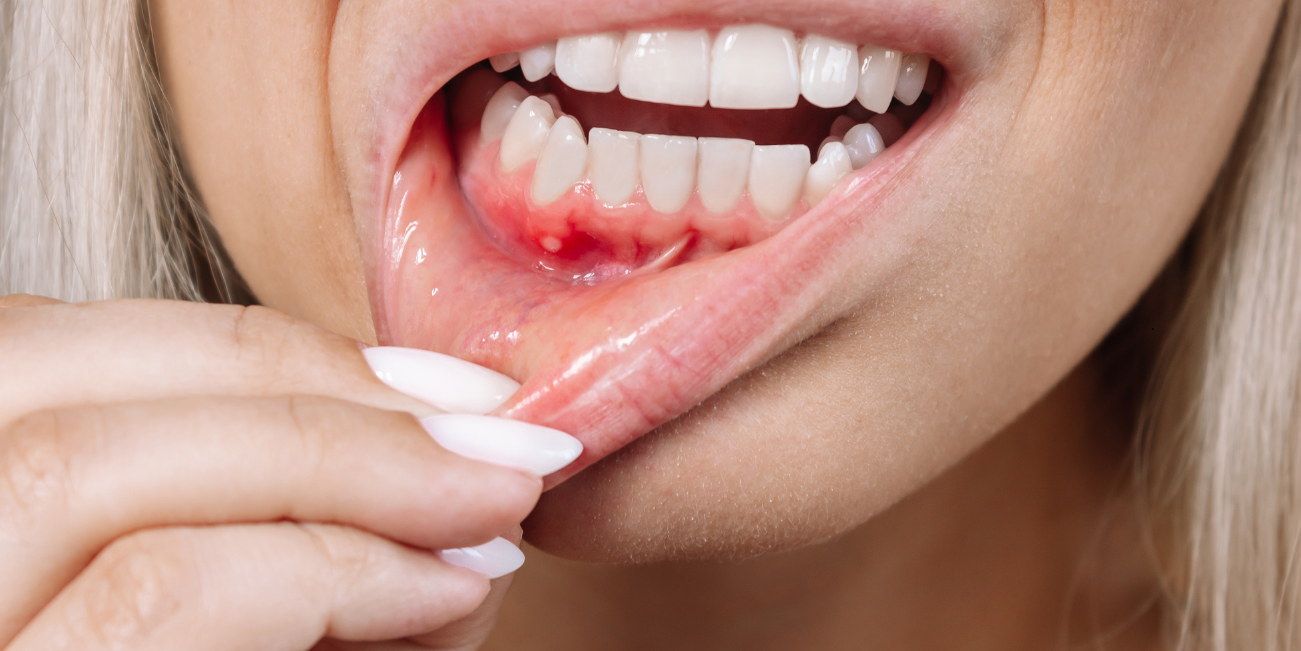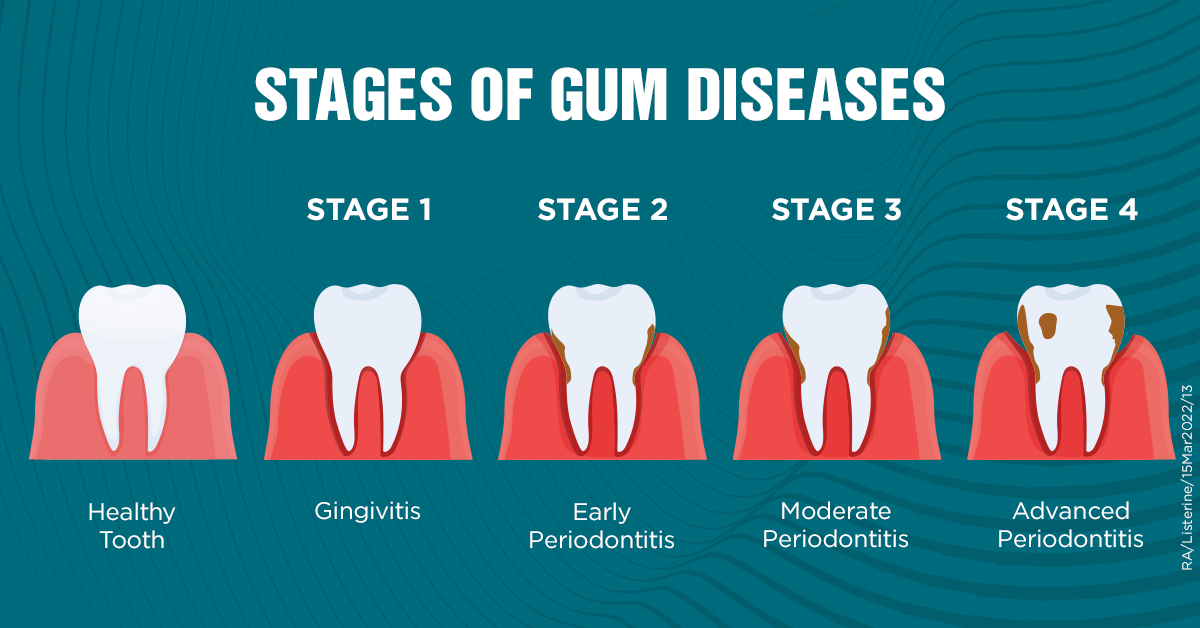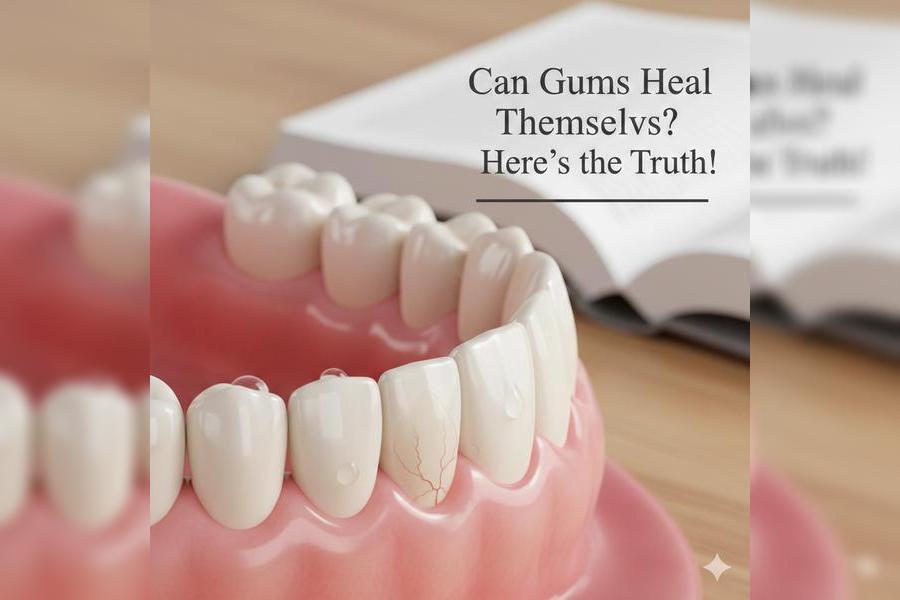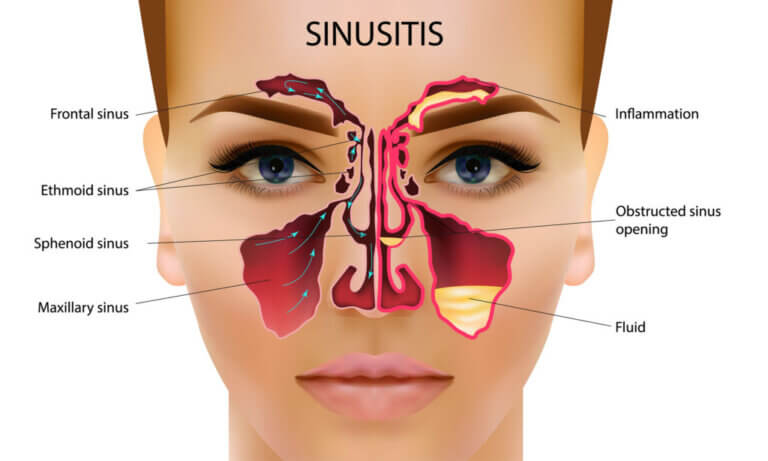Simply imagine that you have bitten into your favorite food, and suddenly your gums are met with sharp pain. Or perhaps you find yourself looking at the mirror - and there’s a tooth hanging. That might sound dramatic, but it is true: Gum disease is the leading cause of adult tooth loss around the world and almost half of adults older than 30 have developed some form of gum disease.
So what happens when gum disease steals your teeth? Can you just pop in a set of dentures and move on with life? That’s where things get tricky. Dentures are meant to restore your smile and confidence, but infected, swollen, or receding gums don’t exactly make the best foundation for false teeth.
This guide takes a no-fluff look at the question “can you get dentures with gum disease?” What dentists really say, the risks, the treatments you need first, and even a natural way to soothe your gums with The Goodbye Company Gum Disease oral solution. If you’re worried about loose teeth, bleeding gums, or the thought of losing your smile for good, keep reading, because the answers may surprise you.
Gum Disease Before Dentures: The Ugly Truth!
Let’s get brutally honest: dentures don’t just sit on your gums; they rely on them. Which means if your gums are in bad shape, your dentures are basically trying to balance on quicksand. Sounds harsh? It is.
Here’s the alarming part: Gum disease is the number one reason adults lose their teeth. Not cavities. Not accidents. Straight-up gum infection. And yet, most people don’t even realize they have it until their teeth start to feel loose, their breath smells like a science experiment gone wrong, or their dentist drops the “P-word” (periodontitis).
What Exactly Is Gum Disease?
It is a deep-rooted infection of the gum tissues that secure the teeth in their sockets. It starts off mildly as gingivitis - red, puffy gums that bleed when you brush - before escalating to the second stage of periodontitis, where the gums recede, the bone decays and teeth begin to fall.
What Is Considered Severe Gum Disease?
Severe gum disease, or advanced periodontitis, is when the damage has gone past swollen gums and turned into full-blown destruction of bone and tissue. This is the stage where people often wonder: “How far can gums recede before teeth fall out?” The truth: if your gums shrink far enough, teeth eventually have no anchor and fall out - sometimes suddenly, sometimes one by one like dominoes.
If you’re even thinking about getting dentures, this is the reality check: your gum health decides whether dentures will feel like a life-saving upgrade or a daily struggle.
Should I Get Dentures if I Have Gum Disease?

Here’s the million-dollar question: “Should I get dentures if I have gum disease?”It is like a Band-Aid solution to problems, change the bad teeth and be done with it. However, here is the twist, dentures fail to treat gum disease. At best, placing dentures on infected gums is like trying to build your house on a swamp - you will only end up deeper in the hole.
Why Rushing Into Dentures Backfires
If your gums are inflamed, swollen, or receding, dentures will:
-
Rub against sensitive tissues, causing pain and sores.
-
Accelerate bone loss under the gumline.
-
Become loose and unstable faster than they should.
In fact, many patients who skip treatment end up with dentures that never fit right, forcing endless adjustments or even replacements.
The Smarter Move
The truth? Yes, you will be able to get dentures - though not until your gum disease is cured. This involves allowing your dentist to do what he/she does best; deep cleaning, giving you antibiotics, or even going through surgery in case it becomes severe. When the infection has been brought under control and your gums have healed, dentures will feel like your new lease on life, and not a new dental ordeal.
So, if you’re sitting in the dentist’s chair wondering, “Should I just get dentures now?”, the better question is: “Have I given my gums a chance to heal first?” Because healthy gums aren’t just a bonus; they’re the foundation that makes dentures worth it.
Who Cannot Get Dentures?
Not everyone is a candidate for dentures. People who may not be suitable include:
-
Those with untreated gum infections.
-
Patients with extensive bone loss who cannot support dentures.
-
Individuals with severe medical conditions that prevent oral surgery.
For such cases, alternatives like dental implants or implant-supported dentures may be considered—but only after gum health is restored.
How Far Can Gums Recede Before Teeth Fall Out?
Think of your gums as the “soil” that keeps your teeth rooted in place. When that soil erodes, the roots lose their grip, and eventually, the tooth has no choice but to give up and fall out. Creepy visuals? Maybe. But that’s exactly what gum recession does.
The Alarming Truth
Once gum tissue pulls back far enough, the roots of your teeth are left exposed. This doesn’t just make teeth sensitive to hot coffee or cold water, it also makes them unstable. Research shows that when you’ve lost about 50% of gum and bone support, teeth are at serious risk of falling out on their own. And unfortunately, it usually doesn’t happen all at once - teeth can loosen and drop out one by one, like a slow-motion domino effect.
Why Recession Happens
Receding gums are most often caused by untreated periodontal disease, but aggressive brushing, smoking, and genetics can speed it up too. If you’ve ever looked in the mirror and thought your teeth looked “longer,” that’s not just aging; it’s your gums waving a white flag.
Connecting to Dentures
So, how far can gums recede before teeth fall out? Far enough that by the time you notice your teeth shifting or feeling wobbly, the damage is usually advanced. This is when many people end up asking about dentures. But remember: if your gums are still infected, you need treatment first - otherwise your dentures will be resting on the same weak foundation.
Is It Too Late to Save My Teeth With Periodontal Disease?

If you’ve been told you have periodontal disease, you might be staring at your gums in the mirror, wondering if your teeth are already on the clock. It’s one of the most common, and scariest - questions patients ask: “Is it too late to save my teeth with periodontal disease?” The answer isn’t a simple yes or no. It depends on how far the disease has progressed and whether you take action now.
Early Periodontal Disease: Hope Is Still on Your Side
In the earliest stage, gum disease begins as gingivitis. At this point, your gums may look red, feel tender, and bleed when brushing - but your teeth are still stable. With professional cleaning and improved oral hygiene, it’s absolutely possible to reverse gingivitis and keep your natural teeth.
This stage rarely raises the dentures question because your dentist can help you stop the damage before it becomes permanent. But it’s a wake-up call: ignoring the signs now only pushes you closer to tooth loss.
Moderate Periodontal Disease: Fighting to Keep Your Smile
When gum disease advances into moderate periodontitis, bacteria begin destroying gum tissue and the supporting bone around your teeth. You may notice:
-
Gum recession (teeth look longer than before).
-
Persistent bad breath.
-
Sensitivity to hot and cold.
-
Slightly loose teeth.
At this stage, you can often still save your teeth, but it takes more than a routine cleaning. Dentists may recommend scaling and root planing (deep cleaning), antibiotics, and regular maintenance appointments.
This is where the question “can you get dentures with gum disease” often comes up. Some people wonder if dentures might be easier than fighting to save their teeth. The truth? If you still have enough gum and bone support, saving your natural teeth is usually the better path.
Advanced Periodontal Disease: When Tooth Loss Becomes Likely
In the advanced stage, called severe periodontitis, gums have pulled away significantly, deep pockets have formed, and bone loss is widespread. Teeth may become very loose or even fall out on their own.
This is often the point when it can be too late to save every tooth. Extractions may be necessary, and for many patients, dentures become the next logical step. However, you still need to treat the underlying gum disease before getting dentures. Otherwise, the infection will continue attacking your gum tissue, making dentures painful and unstable.
Is It Ever Really “Too Late”?
Here’s the good news: even if saving every tooth isn’t possible, it’s rarely “too late” to take control of your oral health. You may not be able to rescue all your natural teeth, but you can:
-
Stop gum disease from spreading further.
-
Prepare your gums for dentures or implants.
-
Prevent future infections.
This is where The Goodbye Company Gum Disease can play a role in your daily care routine. With Omega 3 and 9 oils, neem, and clove essential oils, it helps calm inflammation, reduce bacteria, and support healthier gums, whether you’re trying to save remaining teeth or preparing for dentures.
What Is the Treatment For Gum Disease Before Dentures?

Here’s the cold, hard truth: if you try to get dentures while your gums are still infected, you’re basically asking for trouble. Imagine placing a brand-new carpet on a floor full of termites; the foundation isn’t stable, so no matter how nice the carpet looks, it won’t last. That’s exactly what happens with dentures on diseased gums.
Step One: Professional Treatment
Dentists usually begin with scaling and root planing, a deep cleaning that scrapes away hardened plaque and bacteria below the gumline. If the infection runs deep, they may prescribe antibiotics or even recommend gum surgery to shrink pockets and promote healing. And if certain teeth are too far gone, extractions may be the only way forward before dentures can even be considered.
Step Two: Healing Time
Once treatment is complete, gums need time to recover. Healing may take weeks, sometimes months, depending on the severity of your periodontal disease. This period is critical - skip it, and your dentures will feel loose, painful, and prone to infection.
Step Three: Daily Prevention
Here’s where most people drop the ball. Treating gum disease isn’t just about fixing the damage - it’s about preventing it from coming back. And that’s where daily care steps in.
This is exactly why so many dentists and patients are turning to natural solutions like The Goodbye Company Gum Disease. Unlike harsh chemical rinses, this all-natural formula is powered by Omega 3 and 9 oils combined with neem and clove essential oils - ingredients known for calming inflammation, fighting bacteria, and helping gums heal.
If you currently suffer from bleeding gums, soreness, or sensitivity, this isn’t just “nice to have”, it’s a lifeline. By introducing The Goodbye Company Gum Disease oral solution into your daily routine, you’re giving your gums the chance to actually heal and strengthen before dentures enter the picture. Think of it as giving your gums a fighting chance to hold up the smile you deserve.
Does Gum Disease Go Away When Teeth Are Removed?
This is a tricky question. Some people believe removing teeth solves gum disease. The reality is: gum disease doesn’t automatically disappear when teeth are removed. The infection affects the gums and jawbone, not just the teeth.
If untreated, the bacteria can continue to damage your gum tissues and bone - even after tooth removal. That’s why ongoing oral care, professional treatment, and natural preventative solutions like The Goodbye Company Gum Disease are so important.
Comparing Denture Options For Gum Disease Patients
To better understand your options, here’s a table comparing dentures for patients with gum disease versus dentures for healthy gums:
|
Factor |
Dentures With Gum Disease |
Dentures With Healthy Gums |
|
Comfort |
Often less comfortable due to inflammation |
More comfortable fit |
|
Healing Time |
Longer, gums need treatment first |
Shorter healing period |
|
Risk of Infection |
Higher risk if gum disease is active |
Low risk |
|
Longevity |
Dentures may wear out faster |
Dentures last longer |
|
Stability |
Poor fit due to bone loss |
Better stability |
This table shows why treating gum disease first makes a huge difference in denture success.
At What Stage of Periodontal Disease Do You Lose Teeth?
Tooth loss usually occurs in the advanced stage of periodontitis, when the gums have receded significantly and bone loss has occurred. Once the foundation is compromised, the teeth have nothing left to hold them in place.
This is when many patients transition to dentures - but only after gum disease management.
Natural Gum Care: Why Prevention Matters
Dentures are a solution, but preventing gum disease in the first place is always better. Regular brushing, flossing, dental visits, and natural products can help.
One highly effective option is The Goodbye Company Gum Disease. This all-natural oral care solution is infused with Omega 3 and 9 oils, neem, and clove essential oils - ingredients known for their antibacterial, anti-inflammatory, and healing properties.
If you currently suffer from bleeding gums, tooth pain, or sensitivity to hot or cold foods, adding The Goodbye Company Gum Disease to your daily routine can help heal and prevent gum issues. It’s considered the best natural gum disease cure and an excellent preventative measure, whether you’re planning dentures or not.
Caring For Dentures When You’ve Had Gum Disease

Even after you get dentures, oral care remains crucial. Here are some steps to keep your mouth healthy:
1. Daily Cleaning
Brush dentures and gums twice a day to prevent bacteria buildup.
2. Rinse After Meals
Food particles can get stuck under dentures, irritating gums.
3. Regular Dental Checkups
Dentures may need adjustments as gums and bones change over time.
4. Natural Oral Care Support
Incorporate natural solutions like The Goodbye Company Gum Disease to keep gums healthy and reduce inflammation.
FAQS - Can You Get Dentures With Gum Disease
1. Do dentures accelerate gum disease progression?
Dentures themselves do not directly cause gum disease, but ill-fitting dentures can rub against the gums, leading to irritation, inflammation, and even open sores. This creates an environment where bacteria thrive.
2. Can gum disease return after teeth are extracted for dentures?
Yes. Even after tooth extraction, periodontal pathogens can remain in the gum tissue and bone. If oral hygiene is poor, gum inflammation and bone deterioration can continue. This is why incorporating products like The Goodbye Company Gum Disease - with its Omega 3 & 9 oils, neem, and clove - into your routine is crucial for ongoing gum health.
3. How long should you wait after gum disease treatment before getting dentures?
The timeline depends on healing. After scaling and root planing or tooth extraction, gums usually need 6–12 weeks to heal before impressions for dentures can be taken. For advanced gum disease with bone surgery, healing could take several months.
4. Is gum grafting necessary before dentures?
In cases of severe gum recession, gum grafting may be recommended to restore enough tissue for denture support.
5. What is the best type of denture for patients with gum disease?
Patients with gum disease often benefit from implant-retained dentures or overdentures because they distribute chewing pressure more evenly and reduce irritation of fragile gum tissue. Conventional full dentures may still work, but they require excellent daily hygiene and frequent relining to avoid complications.
Outlook: Can You Get Dentures With Gum Disease?
So, can you get dentures with gum disease? Yes, you can - but only after addressing the gum disease itself. Getting dentures while your gums are inflamed or infected can cause pain, infection, and poor results.
The key steps are:
-
Treat gum disease first.
-
Allow gums to heal.
-
Fit dentures or consider alternatives.
-
Maintain oral care with both professional treatments and natural products.
And remember: The Goodbye Company Gum Disease oral solution can be your daily companion in preventing and treating gum problems, keeping your mouth healthy and ready for dentures when you need them.


